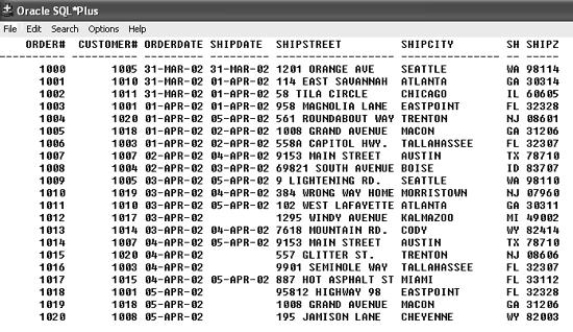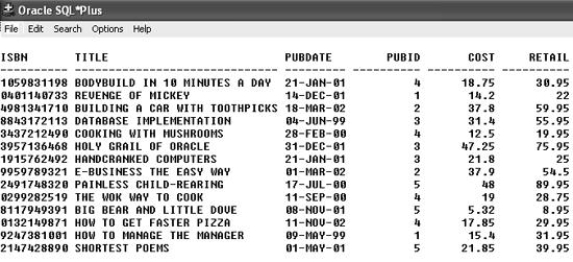Exam 8: Restricting Rows and Sorting Data
Exam 1: Overview of Database Concepts108 Questions
Exam 2: Basic SQL Select Statements121 Questions
Exam 3: Table Creation and Management136 Questions
Exam 4: Constraints132 Questions
Exam 5: Data Manipulation and Transaction Control136 Questions
Exam 6: Additional Database Objects138 Questions
Exam 7: User Creation and Management130 Questions
Exam 8: Restricting Rows and Sorting Data132 Questions
Exam 9: Joining Data From Multiple Tables119 Questions
Exam 10: Selected Single-Row Functions133 Questions
Exam 11: Group Functions137 Questions
Exam 12: Subqueries and Merge Statements131 Questions
Exam 13: Views133 Questions
Select questions type
The ____________________ comparison operator is used when the search condition includes a search pattern.
(Short Answer)
4.7/5  (25)
(25)
Contents of the ORDERS table
 -Which of the following queries will display all orders placed in the month of March?
-Which of the following queries will display all orders placed in the month of March?
(Multiple Choice)
4.7/5  (34)
(34)
When sorting the results in ascending order,which of the following values will be presented last in the output?
(Multiple Choice)
4.7/5  (30)
(30)
A(n)____________________ identifies what must exist or a requirement that must be met before a row is included in the results of a query.
(Short Answer)
4.8/5  (34)
(34)
Search conditions for data contained in numeric columns must be enclosed in single quotation marks.
(True/False)
5.0/5  (36)
(36)
The BETWEEN...AND comparison operator can be used to specify a range of values as a search condition.
(True/False)
4.8/5  (40)
(40)
The ____________________ comparison operator is used to indicate that a data value must fall within a range of values to be included in the query results.
(Short Answer)
4.9/5  (40)
(40)
The maximum number of columns that can be used to sort the results of a query is 52.
(True/False)
4.9/5  (34)
(34)
Retrieving only specific rows from a table is a process known as selection.
(True/False)
4.8/5  (38)
(38)
Contents of BOOKS table

-Based upon the contents of the BOOKS table in the accompanying figure,which of the following queries will display the title and retail price of each book stored in the BOOKS table in order of category and retail price?
-Based upon the contents of the BOOKS table in the accompanying figure,which of the following queries will display the title and retail price of each book stored in the BOOKS table in order of category and retail price?
(Multiple Choice)
5.0/5  (28)
(28)
When performing a search on a(n)____________________ column,the search condition does not need to be enclosed in single quotation marks.
(Short Answer)
4.7/5  (31)
(31)
The ____________________ clause is used to restrict the rows returned by a query.
(Short Answer)
4.9/5  (37)
(37)
Contents of BOOKS table

-Based upon the contents of the BOOKS table in the accompanying figure,which of the following queries will list the title and retail price of each book stored in the BOOKS table,sorted in order of the book titles?
-Based upon the contents of the BOOKS table in the accompanying figure,which of the following queries will list the title and retail price of each book stored in the BOOKS table,sorted in order of the book titles?
(Multiple Choice)
4.9/5  (40)
(40)
Contents of the ORDERS table
 -Based upon the contents of the ORDERS table in the accompanying figure,which of the following queries will display all orders shipped between April 4,2003 and April 5,2003?
-Based upon the contents of the ORDERS table in the accompanying figure,which of the following queries will display all orders shipped between April 4,2003 and April 5,2003?
(Multiple Choice)
5.0/5  (45)
(45)
Contents of BOOKS table

-Based upon the contents of the BOOKS table in the accompanying figure,which of the following queries will display all books stored in the BOOKS table that generate more than 60 percent profit?
-Based upon the contents of the BOOKS table in the accompanying figure,which of the following queries will display all books stored in the BOOKS table that generate more than 60 percent profit?
(Multiple Choice)
4.9/5  (39)
(39)
Contents of the ORDERS table
 -Based upon the contents of the ORDERS table in the accompanying figure,which of the following queries will list all orders contained in the ORDERS table that have been shipped based upon the customer# and order#?
-Based upon the contents of the ORDERS table in the accompanying figure,which of the following queries will list all orders contained in the ORDERS table that have been shipped based upon the customer# and order#?
(Multiple Choice)
4.7/5  (34)
(34)
The SORT BY clause is used to present query results in a specific order.
(True/False)
4.9/5  (38)
(38)
Using the OR logical operator to combine search conditions based upon the same column is the same as using the IN comparison operator.
(True/False)
4.9/5  (23)
(23)
Including the keywords NULLS FIRST in the ORDER BY clause will result in NULL values appearing first in the results,regardless of the specified sort sequence.
(True/False)
4.9/5  (29)
(29)
Which of the following operators can be used to retrieve rows containing NULL values in a specific column?
(Multiple Choice)
4.7/5  (35)
(35)
Showing 41 - 60 of 132
Filters
- Essay(0)
- Multiple Choice(0)
- Short Answer(0)
- True False(0)
- Matching(0)